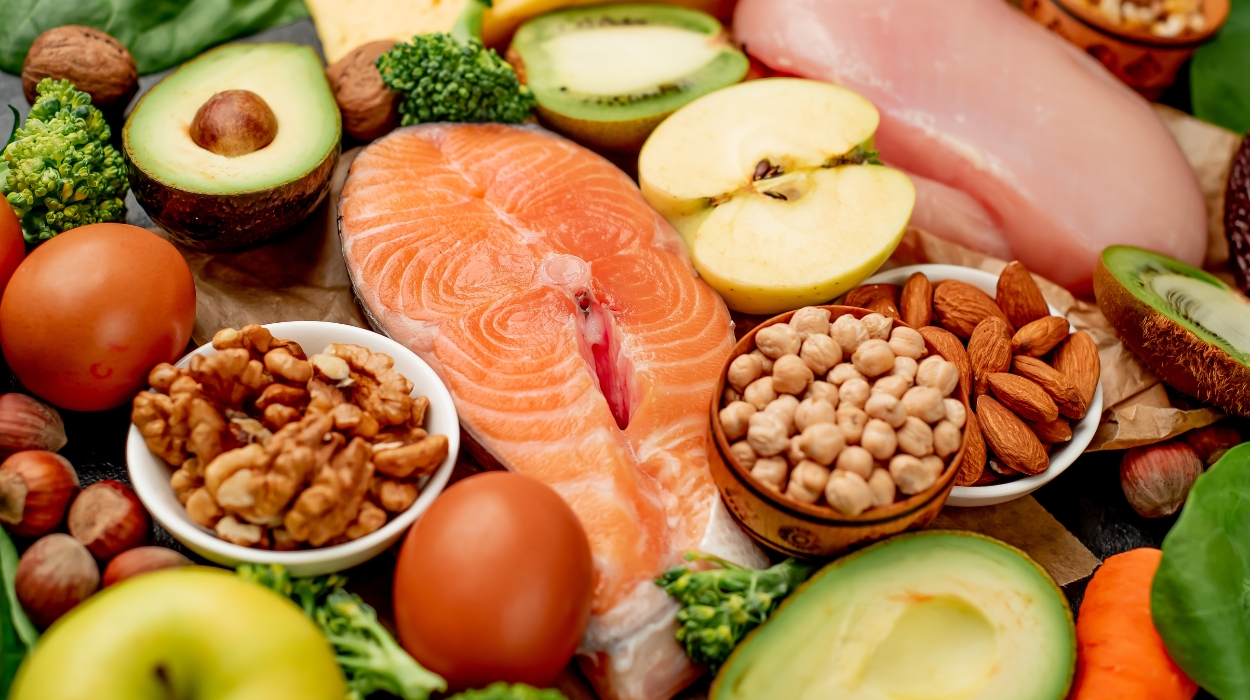 Expert's opinion
Expert's opinion
Expert's opinion
The article is a subjective view on this topic written by writers specializing in medical writing.
It may reflect on a personal journey surrounding struggles with an illness or medical condition, involve product comparisons, diet considerations, or other health-related opinions.
Although the view is entirely that of the writer, it is based on academic experiences and scientific research they have conducted; it is fact-checked by a team of degreed medical experts, and validated by sources attached to the article.
The numbers in parenthesis (1,2,3) will take you to clickable links to related scientific papers.
Lose Weight For Wedding: 6 Practical Tips For The Bride-To-Be 2024

Wedding planning can be a time of great excitement, but diet culture’s looming pressure also adds great wedding stress for many brides. Many people want to lose weight fast before their wedding day, but just because diet culture says you must, doesn’t mean you should feel pressured to do so. It’s important to look beyond the scale and embrace the healthy lifestyle that serves you best.
If weight loss is your goal, it’s best to pursue your fitness goals safely and in a way that encourages long-term health. Wedding planning may boost your motivation to reach your weight loss goals but remember that a lifestyle change and a wedding weight loss plan are different. This article will explore lifestyle changes in pursuit of feeling your best before saying “I do.”.
How To Lose Weight For Your Wedding: 6 Healthy Tips
- Increase Your Protein Intake
- Get Adequate Fiber
- Choose Healthy Fats
- Avoid Skipped Meals
- Plan Ahead
- Incorporate Exercise
6 Best Wedding Weight Loss Tips
When making changes in your healthy lifestyle before your wedding day, it’s important to remember there isn’t one pre-wedding diet. Healthy eating looks different for everyone. Food preferences, cultural traditions, and medical needs all deserve to be addressed when designing a diet plan.
It may be tempting to eliminate an entire food group to promote weight loss efforts, but it’s important to remember that each food group plays a role in your bodily functions. In fact, if you are decreasing your calorie intake significantly, it’s even more important to consume a balance of each food group.
Rather than cutting out food groups entirely, you can adjust your portion sizes and macronutrient ratio to burn energy more efficiently and safely lose weight. Some helpful tips for adjusting your macronutrient intake are as follows.
Increase Your Protein Intake

Research[1] has shown that higher-protein diets of approximately 1.2 to 1.6 grams of protein per kilogram of body weight improve appetite, satiety, and body weight management compared to lower-protein diets. Choosing proteins such as lean meats, dairy, and legumes is efficient in increasing your lean protein intake.
Get Adequate Fiber
The USDA’s Dietary Guidelines for Americans[2] recommend an average of 25 to 28 grams (g) of fiber daily for women under 50 years of age and 31 to 34 g of fiber daily for men under 50 years of age. The recommended intake is slightly less for those over 50 years. Adequate fiber intake helps you stay fuller longer and also helps absorb essential vitamins and minerals. Some studies[3] even suggest meeting your daily fiber needs can help you healthily lose belly fat.
Choose Healthy Fats
Many fad diets promote low-fat or no-fat restrictions, but fats are actually an important part of a healthy diet. Examples of healthy fats include nuts, olive oil, avocado, and fatty fish such as salmon. Of course, there’s always room for your favorite treats, like some delicious dark chocolate (in moderation, of course).
Avoid Skipping Meals
Skipping meals puts you at risk of overeating at the next meal. Instead, aim to eat smaller, more frequent meals each day. This helps maintain your metabolism and keeps you satiated throughout the day. If you’re hungry between meals, don’t hesitate to grab a snack if you’re hungry between meals. In fact, incorporating nutritious snacks between meals is an effective way to include foods that you enjoy and meet your nutrition needs.
Plan Ahead
Planning a wedding keeps you busy. Meal planning in advance is an effective and healthy way to avoid eating on the go. Instead of getting stuck with fast food or other salty food as your only option, prepare meals and snacks the day before and enjoy them between commitments.
Incorporate Exercise

Nutrition isn’t the only factor involved in creating a healthy, balanced lifestyle or maintaining the weight at which you feel your best. Regular exercise helps support your metabolism and burn fat while developing muscle.
How To Lose Weight For Your Wedding?
Many brides turn to the latest “crash diet” to reduce weight quickly in preparation for their big day. These crash diets often require a severely restricted calorie intake in return for a promised change in the number on the scale. Unfortunately, this severe calorie restriction[4] is not realistic long term, and the weight loss you experience may be deceiving.
With a rapid weight loss plan, the drop in weight is often a result of your body losing water. However, if the restriction continues into the long term, your body will eventually start conserving body fat and break down muscle for energy. As a result, you may even see weight gain after alleviating the calorie restriction.
If you’re trying to lose weight fast before the ceremony, it’s best to consider life after weight loss. Feeling your best in your wedding dress does not have to come at the cost of your mental and physical health. Before your big day, building a healthier lifestyle will bring you health benefits beyond your weight loss goal.
Small changes over time will help you feel better and help you to take ownership of your health. A healthy diet (including a variety of foods) and regular workout routine may not be the typical wedding diet plan, but it can often result in losing weight and gaining confidence.
Wedding Diet Plan For Weight Loss
If you are seeking a pre-wedding diet plan, you might consider working with a registered dietitian nutritionist to best meet your nutrition needs while in your weight loss journey. Severe calorie restriction can provide fast results, but it often also comes with health consequences. Severe limits can take a toll on your mental health and can ultimately result in weight gain when you remove the restrictions. Drinking water throughout the day, incorporating various physical activities in your week, and enjoying some of your favorite foods are essential to a balanced lifestyle.
Wedding Weight Loss Workout Program
Exercise is key to a healthy and balanced lifestyle. If weight loss is your goal, regular physical activity is even more influential. The Centers for Disease Control and Prevention recommends[5] approximately 150 minutes of moderate-intensity physical activity combined with at least two days of muscle strength training per week. Incorporating a regular exercise routine with balanced nutrition is recommended for long-term health, but it can also be a healthy wedding weight loss journey. Of course, it is recommended that you speak with your healthcare provider before incorporating new physical activity.
The Bottom Line
If you’re looking to lose weight before your wedding day, downplaying the importance of diet culture’s expectations is a great place to start. Feeling your best in your wedding dress isn’t determined by the number on the scale. It’s important to remember that wedding dresses were made to fit the bride, not the other way around.
But if losing weight benefits your health and helps you feel more confident on your big day, working with a registered dietitian nutritionist can help you do it safely and effectively. While there is no one wedding diet plan, creating your own lifestyle change can promote weight maintenance at your body’s ideal weight and enrich your mental and physical health at the same time. So, just as your wedding celebrates your forever love, let your lifestyle celebrate your health.
+ 5 sources
Health Canal avoids using tertiary references. We have strict sourcing guidelines and rely on peer-reviewed studies, academic researches from medical associations and institutions. To ensure the accuracy of articles in Health Canal, you can read more about the editorial process here
- Leidy, H.J., Clifton, P., Astrup, A., Wycherley, T.P., Westerterp-Plantenga, M.S., Luscombe-Marsh, N.D., Woods, S.C. and Mattes, R.D. (2015). The role of protein in weight loss and maintenance. The American Journal of Clinical Nutrition, [online] 101(6), pp.1320S1329S. doi:https://doi.org/10.3945/ajcn.114.084038.
- USDA (2020). Dietary Guidelines for Americans 2020 -2025 . [online] Available at: https://www.dietaryguidelines.gov/sites/default/files/2020-12/Dietary_Guidelines_for_Americans_2020-2025.pdf.
- Hairston, K.G., Vitolins, M.Z., Norris, J.M., Anderson, A., Hanley, A.J. and Wagenknecht, L.E. (2012). Lifestyle Factors and 5-Year Abdominal Fat Accumulation in a Minority Cohort: The IRAS Family Study. Obesity, [online] 20(2), pp.421–427. doi:https://doi.org/10.1038/oby.2011.171.
- Benton, D. and Young, H. (2017). Reducing Calorie Intake May Not Help You Lose Body Weight. Perspectives on Psychological Science, [online] 12(5), pp.703–714. doi:https://doi.org/10.1177/1745691617690878.
- CDC (2023). How much physical activity do adults need? [online] Centers for Disease Control and Prevention. Available at: https://www.cdc.gov/physicalactivity/basics/adults/index.htm.



